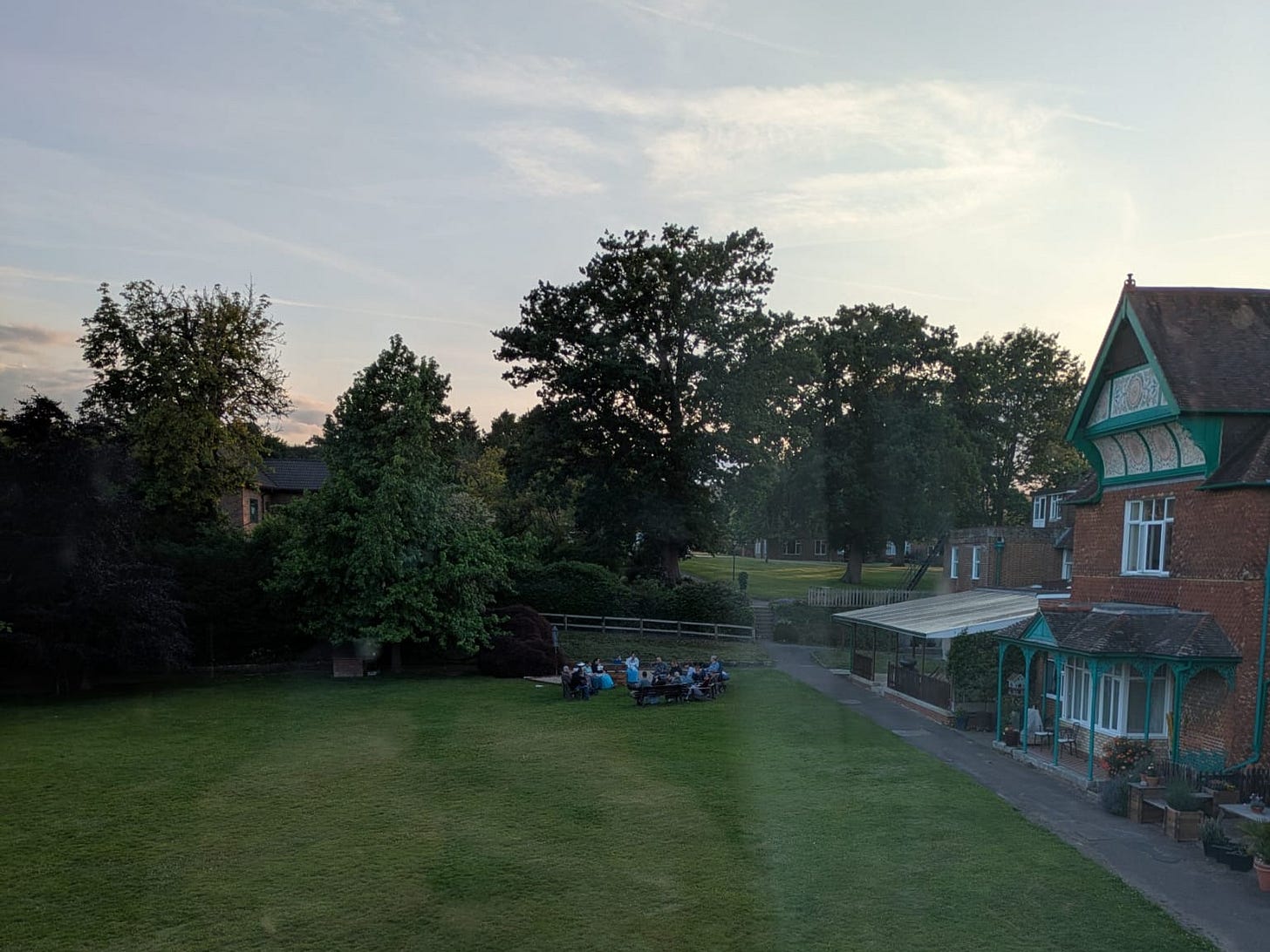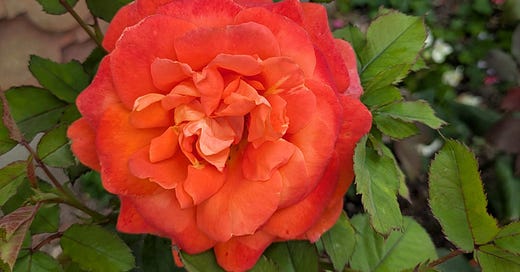Hello readers! I’ve been trying to think of some way to write and post consistently, so I thought I’d try sharing a weekly(?) collection of things I’m experiencing, reading, or reflecting on. I’ll see how it goes and probably let the form evolve over time. If you come to appreciate this or have any suggestions, let me know!
Happenings
Top of mind is still the unexpected death of my friend Esther and her dad, Tim, earlier this month.
One way we celebrated Esther’s life was putting on a small poetry evening in our friend’s living room. Esther loved poetry and wrote some beautiful poems herself. We read some of her recent work and otherwise just hopped around the circle, reading and reciting some of our favorites and those that seemed to suit the occasion. There were nine of us, three couples and three singles, ranging in age from early 20s to 80s. It was a special time and I’m so grateful to live in a community that makes moments like this a natural part of sharing life together.
Reading
I’ve been amazed by the courage and faith modeled by Tim and Esther’s family amidst their unimaginable grief. I’ve also been challenged to examine my own faith and reflect on how firmly I stand on God’s promises.
This has led me to seek out the writings of the early Christians. First I found St. Cyprian of Carthage’s treatise On Mortality, in which he urges his brothers and sisters facing a plague in the early 250s to live with full confidence in the teachings and example of Christ.
Here are some selections:
On how struggle in adversity is a “trial of the truth”:
“The fear and faith of God ought to make you prepared for everything, although it should be the loss of private estate, although the constant and cruel harassment of your limbs by agonizing disorders, although the deadly and mournful wrench from wife, from children, from departing dear ones; Let not these things be offenses to you, but battles: nor let them weaken nor break the Christian's faith, but rather show forth his strength in the struggle, since all the injury inflicted by present troubles is to be despised in the assurance of future blessings.”
On how those departed are “sent before,” not lost, and our witness as Christians:
“To myself also, the very least and last, how often has it been revealed, how frequently and manifestly has it been commanded by the condescension of God, that I should diligently bear witness and publicly declare that our brethren who are freed from this world by the Lord’s summons are not to be lamented, since we know that they are not lost, but sent before; that, departing from us, they precede us as travelers, as navigators are accustomed to do; that they should be desired, but not bewailed; that the black garments should not be taken upon us here, when they have already taken upon them white raiment there; that occasion should not be given to the Gentiles for them deservedly and rightly to reprehend us, that we mourn for those, who, we say, are alive with God, as if they were extinct and lost; and that we do not approve with the testimony of the heart and breast the faith which we express with speech and word.”
I’ve also revisited Eberhard Arnold’s book “The Early Christians: In Their Own Words” (free download available from Plough), which is replete with firsthand accounts of the bold faith of the first believers.
As the editors write in the preface:
“To read the early Christians in their own words is to be confronted with a primal boldness and clarity that sweeps the horizon clean and forces us to take a new look at our own situation. What idols confront us as we strive to follow Christ today? What powers vie for our allegiance? The first believers were a threat to the social system, the power structure, the very moral basis of the society in which they lived. Are we? They sacrificed everything –even their lives – for the sake of the Truth that burned in their hearts. Do we? They sold all they had and gave it to the poor, then banded together in close-knit communities where they took care of the weak and sick, and fed the poor. Can this be said of us?”
These are the questions I’m asking myself again in the aftermath of tragedy, as a member of a close-knit community that aspires to follow their example. I find this book incredibly inspiring and recommend it to anyone who aspires to radical, spirit-filled discipleship.

Reflecting
My journals are full of fragments from my journey to faith over the past ~7 years. I thought it could be interesting to pull some pieces out and dialogue a bit with my old self, hopefully giving glory to God for the change he has wrought in my life so far.
This little meditation is from 2019, written at a coffee shop in Sacramento, California. I was recently married and we were being drawn forward by God. My reflections will follow:
I drag my thumb against the grainy wood of the table and try to bring my mind down to the world, the physical.
“OK, favorite movie, all-time,” the young man a few seats down asks his date in the orange strappy dress. They’re just getting to know each other.Everywhere, we send missives out into space — I’m here, I’m nowhere — are you with me? Can we meet in the void?
We try to lasso each other with invisible strings, to anchor ourselves to points in the dark. We create maps of understanding.
The shadows of palm fronds dance on concrete. We cannot see the heat. We cannot see the color.
Cars go by, I try to hold them in focus, enter the window, make out the driver inside — what’s their vibe?
Blonde with earrings and black leather seats — she’s wrapped in a whole other world.
Entire worlds drive by the coffee shop, entire worlds bloom from the flowerings of a romance a few seats away, entire worlds shift and stretch and contort to fit our words, our visions, our misunderstandings.
A bird hops along the bench in front of me. It puffs its chest. And I wonder about a simpler life.
Reading this now is fascinating to me. I had so much more time and space for contemplation then. I remember the days I would just sit and explore what I was observing and what it called to mind. As a busy mother of three, I do miss that. But what strikes me most is how that “simpler life” has become more of a reality for me. At home in God’s story, I’m not so reliant on maps of my own understanding anymore. And as a Bruderhof “novice,” I live alongside others who share in that same story. There is a fundamental unity that connects us. I don’t have to rely on a carefully crafted identity to earn connection.
However, there are still ideas and questions raised here that apply to my life now. You can share a faith and a life, and yet still not understand so much about the person sitting across from you and their subjective experience. As I explore writing on this Substack, I find I'm asking myself a lot of questions about the opportunity to bring the inner life out to share with others. It’s an exercise that for me is fraught with anxieties, vanities, and genuine concerns about distractions and priorities, but also hints at vitality, vulnerability, authenticity.
One of my favorite writers, John O’ Donohue, sums it up better than I ever could in the opening to his book “Anam Cara”:
“An unknown world aspires towards reflection. Words are the oblique mirrors which hold your thought. You gaze into these word mirrors and catch glimpses of meaning, belonging shelter. Behind their bright surfaces is the dark and the silence. Words are like the god Janus, they face inwards and outwards at once.
If we become addicted to the external our interiority will haunt us. We will become hungry with a hunger no image, person or deed can still. To be wholesome, we must remain truthful to our vulnerable complexity. In order to keep our balance, we need to hold the interior and exterior, visible and invisible, known and unknown, temporal and eternal, ancient and new together. No one else can undertake this task for you. You are the one and only threshold of your inner world. This wholesomeness is holiness. To be holy is natural; to befriend the worlds that come to balance in you.
Behind the façade of image and distraction, each person is an artist in this primal and inescapable sense. Each one of us is doomed and privileged to be an inner artist who carries and shapes a unique world. Human presence is a creative and turbulent sacrament, a visible sign of invisible grace.”
Tim and Esther, as father and daughter, seemed to have very different experiences navigating the threshold O’Donohue speaks of, and yet neither could be said to be “addicted to the external”—quite the contrary. I feel inspired by their lives to find the way to this holy wholesomeness, through ongoing surrender to God and the church.





I love this post; it is vital to take time amidst busy motherhood to feed your soul. Do agree with O'Donoghue who expresses is perfectly: "each human presence is an invisible sign of God's invisible grace". I think of Esther who longed and sought for O'Donoghue's "wholesomeness".